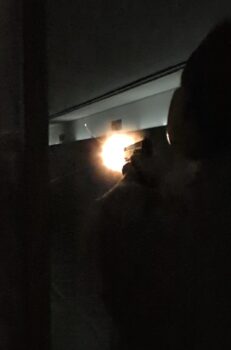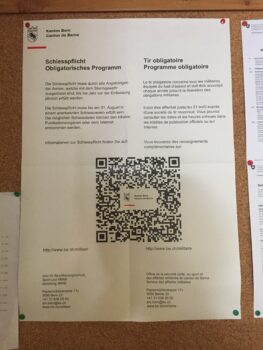“I stayed up last night… Not so much to welcome the new year, but to make sure the old one leaves…”
– Ben David, in the comments to the previous post.
Still, hope springs eternal in the human breast. 2024, here we come.
|
|||||
|
“I stayed up last night… Not so much to welcome the new year, but to make sure the old one leaves…” – Ben David, in the comments to the previous post. Still, hope springs eternal in the human breast. 2024, here we come.
This post is reposted from a source I do not trust (Double Down News) by a person I do not trust (Dr Susan Michie, adviser to the SAGE committee and literal communist) on a topic (the Israel-Hamas war) where AI-generated fakery is rampant. Remember the six-fingered Palestinian child? Closer examination give yet more causes for doubt – the bizarrely elongated finger on the left hand of the soldier second from the left, the way that, perhaps in compensation, the right hand of the rightmost man seems to have no fingers at all. There is something wrong about the bipod of his rifle, too. The angle of the windows on the left of the picture looks off. The flame coming out of the window is too neatly defined. But what interests me is that I thought “AI-generated” before I looked closely enough to see any of that. Possibly the thing that tipped me off, if I am right at all, was that all the elements of the alleged photograph looked exposed to the same degree, when one would think that the glow of the flames would dominate. Even that form of words, which I got from my husband, is more explanatory than whatever it was that screamed “fake” to me. That said, this image is a great deal more realistic than those of only a few months ago. My spidey-sense for fake pictures will not last much longer. Taking a Christmas break from my customary snarkiness, I mean this without irony. I would like to make one of those motivational posters with an inspirational quotation or slogan on it. The slogan would express an idea that I already believe strongly, only I have not yet found the best way to express it. The starting point is a slogan that has many variants, but the version I saw first and like best is:
Knowing my audience, I shall link to the demotivational version as well. It’s a quote from B.J. Novak, who was probably a ray of sunshine until he played the temp in the American version of The Office. So, the slogan for which I reach is similar to that one (the motivational version, not Novak’s), but is about acceptance rather than love. Something like:
Then what? I don’t know what to say. I’m not sure if it’s even a good idea to mention the consequences of the other person saying “no”. I suppose I could say “better to be aware they do not accept you than to be deceived by them feigning acceptance out of fear, which will probably lead to them stabbing you in the back whenever they get the chance”, but that one’s a bit of a downer to put on a poster. The point I really want to make is that true acceptance cannot be had if the person being asked to do the accepting does not have the option to say “no”. The reason I seek a more pithy way to express this sentiment than anything I have come up so far is that, as I said a few years back in a post called “To knock on the door is better than booting it in”, “Like some warrior cultures of old, the grievance culture holds getting what you want by asking or peaceably trading to be fit only for slaves. The superior person does not ask for what they want; they demand it.” This attitude is culturally dominant in both senses. I can see why this disastrous misapprehension arose. There are circumstances where the only moral course is to demand one’s just rights as rights, with not the slightest hint of pleading. But there can be no right to be accepted, just as there can be no right to be loved.  Switzerland is a great country. In most respects Machiavelli’s description of the Swiss as “armatissimi e liberissimi”, “most armed and most free”, still applies. But…  It says,
The Wikipedia article on Conscription in Switzerland says,
Much as I admire the Swiss, I cannot make myself believe that constitutes being liberissimi. From the Wikipedia entry for Lin Biao:
Wagner chief Yevgeny Prigozhin presumed dead after Russia plane crash – BBC
“Research finds ChatGPT & Bard headed for ‘Model Collapse'”, writes Ilkhan Ozsevim in AI Magazine:
The Wall Street Journal covered the same topic, but it is behind a paywall and I have not read it: “AI Junk Is Starting to Pollute the Internet”. They feed Large Language Models (LLMs) such as ChatGPT vast amounts of data on what humans have written on the internet. They learn so well that soon AI-generated output is all over the internet. The ever-hungry LLMs eat that, and reproduce it, and what comes out is less and less like human thought. Here is a foretaste of one possible future from Euronews: “AI-generated ‘Heidi’ trailer goes viral and is the stuff of nightmares” – even if I do have a suspicion that to place a video so perfectly in the uncanny valley of AI-generated content still requires a human hand. “Man ends his life after an AI chatbot ‘encouraged’ him to sacrifice himself to stop climate change”, Euronews.com reports:
When I was growing up one heard a lot about the psychological burden of “Catholic guilt”. One of my Irish relatives distressed the family by writing polemics denouncing it. Twenty-first century Greenism is Catholicism without the mercy. In the environmentalist religion you are stained with the original sin of being human, but no priest can absolve you. Mother Mary will not intercede for you. There is no redeemer. Greens are particularly vulnerable to the spiral of guilt that led this man to take his own life, but do not think for one moment that vulnerable humans “training” AIs to amplify their suicidal thoughts will be a phenomenon limited to Greens. The Euronews story ends with a section headed “Urgent calls to regulate AI chatbots”. I do not think regulation will do anything good. The historical record of government intervention to bring human souls back from the abyss is, well, abysmal. What, if anything, can we do to help? Edit: A timely happening pointed out by bobby b: Professor Jonathan Turley was accused of sexual harassment by ChatGPT – which made the entire episode up, including citing to a nonexistent Washington Post article: “ChatGPT falsely accused me of sexually harassing my students. Can we really trust AI?”
Many of you will be familiar with the names of Professors Turley and Volokh They are both well-known and respected academics. Fortunately, Professor Volokh was the sort of person who would check the truth of an accusation made by a machine, and Professor Turley was in a position to prove his innocence – and to get an article published in USA Today proclaiming it. What happens when someone less sceptical than Volokh sees a machine make an accusation that they do not question? Human beings are usually very ready to believe the worst of their political opponents. What happens when someone whose movements are less well documented than Turley’s is accused and cannot prove their innocence? Or, worse, finds out that the accusation, complete with authoritative-sounding references to dated newspaper articles which few will ever check, has been circulating uncontested for years? How many times has this already happened? My husband and I are currently staying with Niall’s widow. Though she describes herself as not one for comments, she has long been a Samizdata reader. She asked me to say how comforting it was to read the replies to the post announcing his death. She described it as “a real joy” to her to see how highly Samizdata readers and posters regarded Niall’s writing. Niall’s actual cause of death was an aortic dissection which led to a stroke. Evidently he had had an aortic aneurysm without knowing about it. In these times it is perhaps worth saying that Niall had received the original two Covid vaccines, but chose not to have the autumn booster, so that cannot have been the cause of death. I do not want to end this post by focussing on the medical details. Niall’s wife asked me to let you know about a little detail that is much more representative of his life: Niall’s computer was open at Samizdata when he died. A couple of hours ago, Niall Kilmartin’s wife telephoned me with terrible news. Last night, Niall suffered a heart attack and a stroke. He was rushed to hospital but died during the night. Niall was my dear friend for more than forty years, a friend to my husband for even longer, and to my children for all their lives. I know he valued Samizdata immensely. Read the comments that he made yesterday to my previous post. As ever they are full of wonderful scholarship and commitment to truth. I can hardly make myself believe that we will not continue the conversation in this life. May he rest in peace. |
|||||

All content on this website (including text, photographs, audio files, and any other original works), unless otherwise noted, is licensed under a Creative Commons License. |
|||||